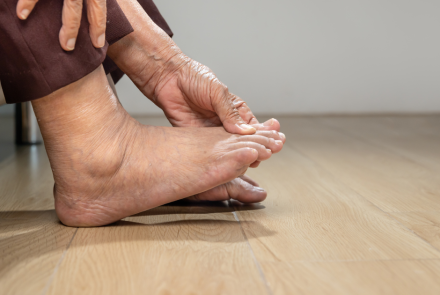When people are dealing with stress, they often make things worse by criticizing themselves, according to Serena C. Fisher, MSN, FNP-BC, Family Nurse Practitioner at Highland Internal Medicine. She tells patients that the first step in dealing with stress is learning to practice self-forgiveness. “You are always listening to yourself. Repeated negative self-talk increases stress levels, which in turn can have a negative impact on your overall health,” she said. “Often we are our own worse critic and are unaware of the damage we are doing to ourselves. Try to remember that not every thought, or emotion you experience is reality or truth, as feelings and thoughts can be influenced by those around you.”
Positive Affirmations
Fisher tells her patients to use positive affirmations to help reduce stress. These are an intentional form of self-talk in which you tell yourself encouraging things. It can help disrupt negative thought patterns and improve self-confidence. Examples of positive affirmations include statements such as: I am enough, I am deserving of love, I am proud of myself and my accomplishments. “You do not need to believe what you are saying, eventually that will come with time.” Fisher said. “All it takes is to confidently repeat this positive self-talk every day as a part of your daily self-development routine.”
Tapping Away Stress
There are some effective steps you can take to relax in stressful situations, Fisher says. One method she recommends is known as tapping. This draws on the ancient Chinese practice of acupuncture, which teaches that the body’s energy travels along specific pathways. In acupuncture, certain points on these pathways are stimulated with needles to improve the flow of energy. But instead of using needles, tapping uses one’s own hands on specific points throughout the body to send calming signals to the brain. “It tells the body and brain it’s safe to relax,” she said. “It can help to reduce anxiety, and lessen that feeling of being overwhelmed.”
Tapping follows a set sequence:
- First, develop a setup phrase by focusing on the issue at hand. A common set up phrase is “Even though I feel anxious, I deeply and completely accept myself.”
- Acknowledge your feelings. Then accept yourself despite these feelings by telling yourself, “I’m only human,” and allow yourself to let those feelings go.
- Begin the tapping sequence. Start with using the side of one hand to “karate chop” the palm of the other hand, while simultaneously reciting your setup phrase three times.
- Use the tips of your fingers to start gently tapping specific sites in order 3 to 7 times each: above the eyebrow, the temple, underneath the eye, underneath the nose, the chin, the collarbone, about 4 inches underneath the armpit, and the top of the head.
- Take a deep breath and check in with yourself.
“You can do this series multiple times, as needed,” Fisher said. There are tapping apps you can use to guide you as you go. “Take five minutes to do a tapping exercise when you’re feeling overwhelmed, so you can collect yourself.”
Other stress management techniques Fisher recommends include:
Practice yoga. This ancient practice helps bring together mind and body. “Yoga helps improve strength, balance and flexibility,” Fisher said. “It lowers stress and reduces whole-body inflammation. It can decrease anxiety, as well as arthritis pain. It’s a great way to start the day.” If you aren’t flexible, you can do yoga from a chair, she noted.
Do breathing exercises. Deep breathing exercises can be very helpful in reducing pain, anxiety and stress, Fisher said. They can help improve lung function and can improve your posture as well. One good breathing exercise is belly breathing. Start by placing one hand on your chest and the other on your belly. This will aid you in gaining awareness of the movement of your chest and abdomen. Inhale deeply through your nose for four seconds, (the hand on your belly should rise while the hand on the chest remains still), then exhale for 5 or 6 seconds while gently contracting your abdominal muscles. “The exhale helps the body relax,” she said.
If you try at-home remedies for stress reduction and you still feel anxious, you may want to work with a therapist, Fisher said. “Talk therapy can be beneficial both in times of crisis and when things aren’t so critical,” she said. “Working with a mental health professional, you can learn to develop new coping mechanisms for dealing with traumas.”
“Taking control of your overall health can be a daunting challenge,” Fisher said. “My patients who have learned to treat themselves a little more kindly, exercise regularly, and make their overall health a priority have an easier time managing their chronic illnesses and have generally become healthier, happier people.”






